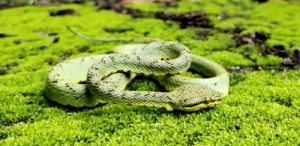World Snake Day: Snakes are critical to environmental health

By Manoj Kumar Jena, OP
Hiss… Most of us get scared hearing this sound snakes produce, but it is primarily a defensive mechanism used to deter potential threats. People have a deadly fear of snakes, as a single bite can end a life in hours. For this reason, snakes often fall prey to human grudge.
As the conflict continues to this day, it is important to understand the reptile’s importance to our environment — especially as this year’s theme, “Respect, Don’t Fear: Protecting Nature’s Silent Guardians,” promotes compassion and conservation.
Speaking to OrissaPOST, experts called for greater awareness about snakebites and the need to protect this beautiful species.
Sathee Parivar, an organisation dedicated to the rescue and conservation of snakes, has been working to bridge the gap between snakes and humans by spreading awareness.
Highlighting snakes’ role in the food chain, the organisation’s president Siddharth Pradhan said, “When people hear the word snake, they fear for their life. But in reality, snakes are friends of humans — particularly farmers. As we all know, mice and shrews eat crops, but rat snakes prevent this. They play a key role in controlling the rodent population in farmlands.”
Pradhan added that many lives are lost due to reliance on superstitious methods and lack of awareness.
“People living in remote areas resort to superstitious practices instead of taking snakebite patients to hospitals. If proper and timely treatment is given, many lives can be saved. The government must ensure more awareness programs in these areas,” he said.
Snake rescuer Aditya Behera said, “People fear snakes in India more than they fear tigers. But snakes are definitely not our enemies — we are their enemies. Snakes never attack humans first; they only strike when they sense danger.”
Behera added, “Some people kill snakes assuming they are dangerous, but this must stop. A decline in the snake population will damage the natural ecosystem. Most significantly, snake venom is used to prepare medicines for critical diseases like cancer.”
Urging people not to kill snakes, he said, “Due to urbanisation, these reptiles are unable to live in their natural habitats and sometimes enter our homes. Rather than killing them, people should alert snake helpline organisations or the Forest Department for rescue and relocation.”
Senior Zoological Survey of India (ZSI) scientist and snake expert Pratyush Mohapatra said, “India is home to at least 367 taxa of snakes, of which 81 are considered potentially dangerous. In Odisha, 76 species have been identified and recorded so far, with 28 being venomous.”
He explained that only five to six species are responsible for most snakebite deaths — including the spectacled cobra, monocellate cobra, common krait, and Russell’s viper.
“Interestingly, the monocellate cobra is restricted to the northeastern parts of Odisha — Balasore, Bhadrak, and Jajpur. The saw-scaled viper, one of India’s ‘Big Four’ venomous snakes, has a patchy distribution in Odisha and is considered uncommon,” he said.
Mohapatra stressed the need for a comprehensive mechanism — One Nation, One Compensation — for snakebite victims.
“It is high time the ‘Payment of Compensation to Victims of Natural Calamities and Snake Bite Act, 2014’ is effectively implemented across all states. This would ensure free treatment and financial assistance for victims. Similarly, under the Small and Marginal Farmers’ Welfare Act, 2014, small or marginal farmers who suffer from snakebite or other animal attacks during agricultural work are entitled to compensation,” he said.
According to the act, the compensation amount is not less than ₹50,000 for partial disability and ₹1,00,000 in case of permanent disability or death.
Dr. Kumar Soumyakanta Bisoi, a consultant physician at Angul District Headquarters Hospital, said, “As cold-blooded animals, snakes are attracted to heat. During rains, they move toward the warmth produced by humans and take shelter near human habitations. People in rural areas mostly sleep on the floor, and their movement may alert snakes, which then bite as a defensive reaction.”
Bisoi recommended sleeping on beds, keeping surroundings clean, and using mosquito nets to help prevent snakebites. “If you are going to collect forest produce, you should wear proper high-ankle shoes,” he said.
He also emphasised the medical value of snake venom. “Venom is not only used to make medicines for various diseases, but it is also used to create antivenom. For instance, if a person is bitten by a cobra, the venom from the same species is used to prepare the antivenom. There is no other medicine for snakebite.”
PNN
News